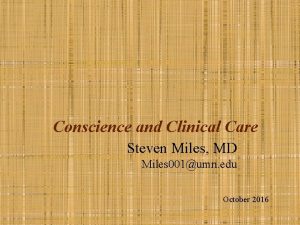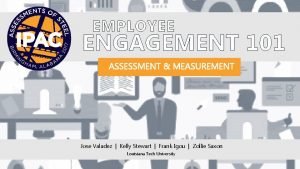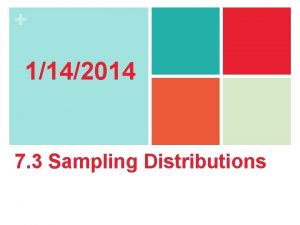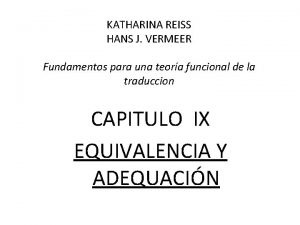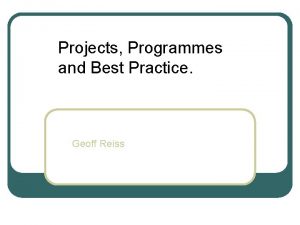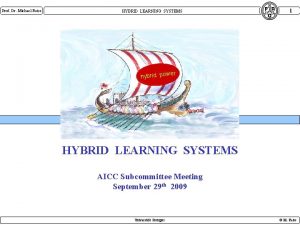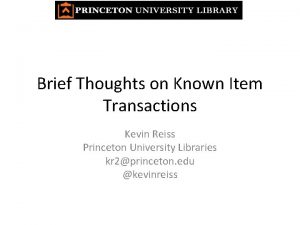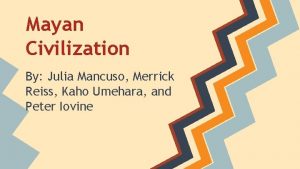Everyday Tyranny Professor Steven Reiss 1142014 1 Everyday











































- Slides: 43

Everyday Tyranny Professor Steven Reiss 11/4/2014 1

Everyday Tyranny: Why You Need to Understand Yourself Before You Can Help Others 3/9/2021 2

Professor Steven Reiss • • • Educated at Dartmouth, Yale, and Harvard Taught at Illinois-Chicago, Ohio State Universities Discovered anxiety sensitivity (2000+ studies) 5 national research, clinical, leadership awards Discovered 16 basic desires (16 universal goals) Author of 3 widely-used psychological assessments: Anxiety Sensitivity Index, Reiss Screen for Maladaptive Behavior, Reiss Motivation Profile® 11/4/2014 3

Relevance of Everyday Tyranny • • Self-Determination Quality of life / happiness Increase in stress Reduction of conflict 3/9/2021 4

Everyday Tyranny • People trying to improve you whether you like it or not • Partner, friend, caregiver, or teacher trying to help you change who you are even if you don’t want to change • It is for your own good 3/9/2021 5

“Never on Sunday” • Homer is an unhappy scholar. Reads literature to find happiness • Ilya is a happy prostitute. Pays no attention to culture/ literature • Unhappy Homer teaches happy Ilya how to be truly happy by immersing herself in culture. 3/9/2021 6

Tools of Everyday Tyranny • Pressure • Argument • Expanded/ tightened control of schedule/ activities • Criticism • Punishment 3/9/2021 7

Our Thesis Assumption 1: We are individuals to a much greater degree than we typically realize. Example: Homer is an intellectual. Ilya is a sensualist. Homer mistakenly thinks Ilya can become an intellectual like he is. Ilya mistaken thinks Homer can become more of a sensualist. 3/9/2021 8

Our Thesis Assumption 2: We are naturally motivated to assert our values in our relationships. Homer values ideas, understanding, knowledge. Ilya values fun and romance. Example: Homer pressures Ilya to embrace intellectual values. Ilya pressures Homer to lessen valuation of intellectual pursuits. 3/9/2021 9

Our Thesis Assumption 3: Value differences motivate repeated conflicts. The pair has the same argument over and over. Examples: Ambitious and laid-back partners quarrel over work schedules. Independent and interdependent partners quarrel over closeness, such as not sharing feelings. 3/9/2021 10

Our Thesis Assumption 4: Self-awareness and tolerance of different natures and values are essential to lessen and get along with other people. Examples: To achieve the public policy goal of self-determination, caregivers need to understand tolerate the diverse values of the people they serve. 3/9/2021 11

Relationships Everyday tyranny occurs in all kinds of relationships including: • • Caregivers & consumers Work supervisors & employers Team members Partners 3/9/2021 12

Self-Hugging • People confuse their individual nature for human nature • George Ramsay, 19 th-century Oxford University philosophy of happiness 3/9/2021 13

Deep Down, What Makes Us Tick? “Every person is constituted to seek, to strive, and to desire certain goals that are common to the species. ” William Mc. Dougall, Harvard University 11/4/2014 14

4 Generations of Harvard Professors 1890 - 1970 • • • William James – instincts William Mc. Dougall – instincts Henry Murray – psychological needs Robert W. White – intrinsic motives David Mc. Clelland – psychological needs 11/4/2014 15

Methods Used to Create Lists of Needs, Intrinsic Motives • Instinct theorists studied animals, primitive tribes • Personality theorists studied the unconscious mind using projective techniques (TAT) • Humanists (Maslow) studied self-actualized people and children • Social psychologists (Lepper, White) studied choices made without extrinsic incentives • Steven Reiss and colleagues directly asked people 11/4/2014 16

Scientific Identification of Needs • • • Asked diverse groups of people (N= 7, 000) Now > 90, 000 on 4 continents Exploratory Factor Analysis Confirmatory Factor Analysis Concurrent Validity (e. g. , Big 5) Predictive Validity (sports, media viewing habits) 11/4/2014 17

16 Basic Desires • The results of Reiss’ surveys show 16 basic desires common to everyone and deeply rooted in human nature. • The list of basic desires overlaps about 50% with previous lists of needs. • Each need is defined carefully based on research results – for example, adult play is about fun, not competence. 11/4/2014 18

16 Basic Desires • Acceptance, the desire to avoid criticism and rejection • Curiosity, the desire for understanding • Eating, the desire for food • Family, the desire to spend time with family 11/4/2014 19

16 Basic Desires • Honor, the desire for character (moral code) • Idealism, the desire for social justice • Independence, the desire for self-reliance • Order, the desire for structure 11/4/2014 20

16 Basic Desires • Physical Activity, the desire to move one’s muscles • Power, the desire for influence of will • Romance, the desire for sex • Saving, the desire to collect 11/4/2014 21

16 Basic Desires • Social Contact, the desire for friendship • Status, the desire for prestige • Tranquility, the desire for inner peace • Vengeance, the desire to get even 11/4/2014 22

Individuality • The 16 basic desires make us individuals. • Everybody seeks all 16 goals, but individuals prioritize them differently. • We are individuals to a much greater extent than many have realized. 11/4/2014 23

Reiss Profile® • Everybody embraces all 16 basic desires, but people prioritize, value, and combine them differently. • How a person prioritizes the 16 basic desires, called a Reiss Profile®, predicts his/her grades, proneness to violence, and relationships with parents, teachers, and peers. 11/4/2014 24

16 Desires in Relationships • Everyday tyranny occurs when two people priorize/ value very differently the same basic desire [universal goal, need, intrinsic motive] 3/9/2021 25

Everyday Tyranny: Ego Restriction Caregivers/ teachers with a high need for acceptance are sensitive to failure and insecure. They might minimize consumer failures by restricting participation to easy tasks, lowering expectations, and discouraging effort. IT IS FOR THEIR OWN GOOD! 3/9/2021 26

Everyday Tyranny: Practical Relevance Caregivers/ teachers with a low need for curiosity value practicality. They might teach relevant skills but not answer questions, explain things, or help consumers understand discover the wonder of life. IT IS FOR THEIR OWN GOOD! 3/9/2021 27

Everyday Tyranny: Tasteless Food Caregivers/ teachers/ administrators with a low need for eating derive little enjoyment from meals. Underestimating how much pleasure some people derive from eating, they might provide bland, tasteless meals aimed at nourishment, not enjoyment. IT IS FOR THEIR OWN GOOD! 3/9/2021 28

Everyday Tyranny: Discipline! Caregivers/ professionals with a high need for honor tend to misinterpret impulsive actions as a lack of morality. They might think that what consumers need most is training in moral discipline. IT IS FOR THEIR OWN GOOD! 3/9/2021 29

Everyday Tyranny: Segregation High need for status motivates people to value reputation. To protect consumers from stereotypic reputation, hide them away in institutions or in special education classes. IT IS FOR THEIR OWN GOOD! 3/9/2021 30

Everyday Tyranny: Paternalism Caregivers/ planners with a low need for independence underestimate how much some people value self-determination. They tend towards paternalism when planning a consumers’ futures, thinking parents and caregivers know best. IT IS FOR THEIR OWN GOOD! 3/9/2021 31

Everyday Tyranny: Minding Own Business Caregivers/ planners with a low need for idealism underestimate how much some consumers value helping others. Instead, they teach them to mind their own business and not help peers in need. IT’S FOR THEIR OWN GOOD! 3/9/2021 32

EVERYDAY TYRANNY: Always Neat Rooms Caregivers with a high need for order value neatness (“everything in its place”). They might badger consumers to keep their rooms much neater and cleaner than the consumers themselves are comfortable with. IT IS FOR THEIR OWN GOOD! 3/9/2021 33

Everyday Tyranny: Endless Television Caregivers/ teachers with a low need for physical activity value sedentary lifestyles. They might see nothing wrong with putting a group of consumers in a day room and having them watch television all day long. IT IS FOR THEIR OWN GOOD! 3/9/2021 34

Everyday Tyranny: Get Serious! Caregivers/ teachers with a low need for social contact may frown on rowdy behavior, or when consumers have fun. They may encourage consumers to be serious more often than necessary. IT IS FOR THEIR OWN GOOD! 3/9/2021 35

Antidote: SELF AWARENESS • Learn who you are (needs, values) • Learn who your consumers are (needs, values) 3/9/2021 36

REISS MOTIVATION PROFILE® Reiss Motivation Profile® Self-discovery tool for caregivers Reiss School Motivation Profile Self-report, ages 12 & up Reiss Motivation Profile® Children Ratings scale, ages 4 -11 Reiss Profile Human Needs Rating scale assessing needs IDD 3/9/2021 37

Antidote: Tolerance People tend to have the same arguments over and over. They do not resolve because they are conflicts of values. Generally, you can’t change another person’s values, and they can’t change yours. But people keep trying anyway. When it comes to relationships, the choice is everyday tyranny or tolerance. Endless fighting or “let it go. ” 3/9/2021 38

Tolerance is essential for successful human relationships, including relationships between caregivers and people with disabilities, teachers and students, and work supervisors and their employees. 3/9/2021 39

RMP Certification Training • 2 -day training seminar: January 10 -11, 2015 in West Palm Beach, Florida • Aimed at a small number of international business consultants • Heavily discounted fee for a limited number of school professionals • Multiple offerings based in Palo Alto, Singapore, Berlin, Vienna, Helsinki, Zurich 11/4/2014 40

Further Reading • Who am I (www. amazon. com) is for educated public • Human Needs and Intellectual Disabilities (www. thenadd. org) is for counselors and coaches • Reiss Motivation Profile and Myths of Intrinsic Motivation (www. idspublishing. com) are for researchers 3/9/2021 41

CONTACT INFORMATION Website: www. motivatelearning. com Email: ids@idspublishing. com Telephone: 614 -885 -2323 11/4/2014 42

© Copyright IDS Publishing 2014 These Slides are from an IDS Webinar presented on November 4, 2014 by Professor Steven Reiss. The use of these slides is strictly limited to nonprofit educational purposes. The slides may not be reproduced, in whole or in part, for any commercial activity. The slides may not be sold nor rented nor included in any package that is exchanged for anything of value by any person or entity without prior written permission from the copyright holder. 3/9/2021 43
 Steven reiss
Steven reiss Promotion from associate professor to professor
Promotion from associate professor to professor Zick rubin love scale
Zick rubin love scale Ira reiss wheel theory of love
Ira reiss wheel theory of love Michael itagaki
Michael itagaki Katharina reiss text types
Katharina reiss text types Reiss wheel theory of love
Reiss wheel theory of love Skopos theory
Skopos theory Functional theories of translation
Functional theories of translation Torino recapito reiss romoli
Torino recapito reiss romoli Tyranny in the greek polis arose as
Tyranny in the greek polis arose as How did the constitution guard against tyranny dbq
How did the constitution guard against tyranny dbq Abcs of ancient rome
Abcs of ancient rome The tyranny of the rocket equation
The tyranny of the rocket equation Paine compares tyranny to hell in order to
Paine compares tyranny to hell in order to Definition zeal
Definition zeal Oligarchy definition world history
Oligarchy definition world history Checks and balances dbq
Checks and balances dbq Sparta tyranny
Sparta tyranny Karens nnn
Karens nnn Tyranny eb romance
Tyranny eb romance Steven miles md
Steven miles md Steven levy wired
Steven levy wired In his course steven roberts uses original films with
In his course steven roberts uses original films with Steven johnson menular atau tidak
Steven johnson menular atau tidak Steven conolly
Steven conolly Steven wallace ucla
Steven wallace ucla Steven frank valadez
Steven frank valadez Richard solit
Richard solit Horizon house steven holl
Horizon house steven holl Seacoast utility authority
Seacoast utility authority Steven garfin md
Steven garfin md Steven bardy
Steven bardy Customer service dialogue
Customer service dialogue Steven lim arbitrator
Steven lim arbitrator Harry williams lmhc
Harry williams lmhc Steven blyth
Steven blyth Steven vidaurri kansas city
Steven vidaurri kansas city Steven boyce md
Steven boyce md Dr joshua snodgrass
Dr joshua snodgrass Jason dearden
Jason dearden Steven proto
Steven proto Steven colgan
Steven colgan Steven pollock physics
Steven pollock physics





















